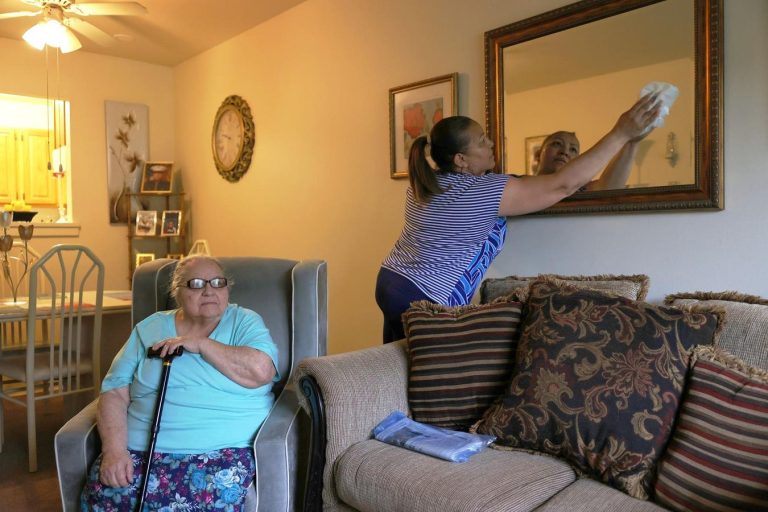This year, California took the second of two steps to allow residents with unlimited assets to participate in its Medicaid long-term services and supports (LTSS) program. Advocates hoped the move would make the program far more widely available. Conservative critics feared it would become a budget-busting open door for the wealthy to take advantage of a public program.
Both were wrong.
Yet, the California experience may end up in the middle of a bruising battle over Medicaid LTSS, where conservatives try to tighten federal program rules while blue states try to ease them.
California’s Changes
Before California changed its asset rules, about 1.1 million people received long-term care through the state’s Medicaid program, called Medi-Cal. In 2022, after the state increased its asset limit to $130,000, it figured 12,189 people became newly eligible for the benefits—about a 1 percent increase.
Since enrollees no longer have to report their wealth, the state’s Department of Health Care Services cannot track how many more people enrolled as a result of the asset test’s elimination. However, earlier this year it estimated an additional 30,000 people could have been eligible, according to a spokeswoman. In the unlikely event they all enrolled, Medi-Cal LTSS enrollment could have increased by a total of about 52,000 since the asset limit was first raised to $130,000, or about 5 percent.
Countable Assets
California’s experience could encourage other states to at least increase their asset limits, though perhaps not eliminate them entirely. In most states, the limit is tied to eligibility rules for the federal Supplemental Security Income (SSI) program. That threshold, $2,000 for individuals and $3,000 for couples, was set in 1989 and has not increased with inflation.
The threshold applies to what are called “countable assets,” which generally include bank and brokerage accounts, cash, and, in some states, retirement savings. Homes valued at up to about $1 million and personal property generally are not counted.
Some states have more liberal asset rules than $2,000/$3,000. New York’s asset limit for a single individual is $31,175, for example.
Why The Small Enrollment Bump?
Why did California’s seemingly dramatic step result in such a small increase in eligibility and enrollment?
One reason is the state still imposes an income test for applicants. For older adults and people with disabilities, participation is limited to those making 138 percent of the federal poverty limit, about $1,732-a-month in California. For context, that is less than the average Social Security benefit of about $1,900.
For the vast majority of potential Medicaid participants, it is the income limit that really determines their eligibility. And nearly all of those with high net worth also have income in excess of the state threshold, so they still are ineligible.
Another reason, often ignored by conservative critics of Medicaid LTSS, is that Medicaid LTSS benefits often are extremely limited. California is relatively generous, but many other states are not. Medicaid is a critical safety net for the poor, but few people with wealth would choose to live under the program’s limitations.
For example, a recipient often must share a room with a stranger in a Medicaid-funded nursing home. And those receiving care at home, now about 80 percent of Medicaid LTSS recipients, may get only a limited number of hours of personal care. Without the support of a capable family caregiver in their home, it often is not possible for a frail older adult to stay at home, even with the Medicaid benefit.
Eliminating the asset test has important benefits. For example, it simplifies the application process. The existing rules are complicated and confusing, require substantial paperwork, and often discourage those who are eligible for benefits from applying.
Flashpoint
Eligibility for Medicaid LTSS and recipient costs are likely to become a political flashpoint over the next few years.
The incoming Trump Administration is not going to boost the SSI income test. But it may go the other way and move to tighten program rules. At the most extreme, some congressional Republicans and close allies of Trump would like to put an annual cap on the federal contribution to Medicaid, a step that would force states to choose between benefits for working age people, children, frail older adults, and younger people with disabilities.
Supporters of cutting federal contributions will almost surely use the California move as an argument. They’ll say, “Even millionaires can get Medicaid in California.”
Or Trump could take more narrow but still significant steps. For example, he may crack down on the use of certain trusts that can exclude wealth from the asset tests.
Conservatives also have been pushing to require states to more aggressively recover Medicaid benefits from an enrollee’s estate after they die. Today, some states aggressively pursue these assets while others do not.
Conservatives argue estate recovery will reduce Medicaid LTSS costs by recapturing payments to participants who were able to keep valuable homes, even in states with an asset test. Consumer advocates say heirs should be able to inherit homes and congressional Democrats have introduced bills to end estate recovery.
The battle over Medicaid may become intense over the next few years. Watch to see how it is affected by California’s asset test repeal.
Read the full article here









